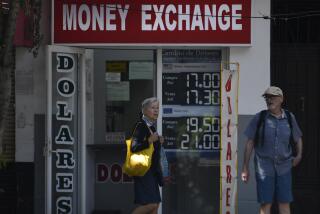Economists Caution Mexico to Increase Savings Rate
- Share via
AGUASCALIENTES, Mexico — Mexico, which helped tip Latin America into the 1980s debt crisis, is again in a fix due to its over-dependence on foreign capital, economists say.
The country that has been the darling of foreign investors for much of the 1990s has suddenly found itself in need of what many say should long have been the motor oil of its economic development--private savings by its own people.
Mexicans need to “change our habits, especially by saving, because domestic savings are now the key element to achieve our economic goals,” said Jose Manuel Contreras, head of the Mexican Institute of Financial Executives, or IMEF, a powerful forum of bankers meeting here this week.
In an annual report, released in this central Mexican city, the IMEF raised a startling point about a country that--until this year--was considered a star among emerging markets.
While foreigners poured more than $26 billion into Mexico’s stock market over the last four years, Mexicans may have actually pulled more money out than they put in over the same period.
“One of the weak aspects of Mexico’s recent evolution is the lack of domestic savings,” the report says, noting that the country saves only about 15% of the wealth it produces, or less than half that of bustling emerging economies like Singapore, Malaysia and South Korea.
Instead of investing in stocks, bonds and other assets that grease the wheels of economic expansion, analysts say Mexicans have developed an attitude that is typical after years of pent-up demand during the cash-strapped period of the debt crisis: Buy now, save later.
Consumer spending has risen, imports have soared above exports and the country has financed the growing trade bill by attracting copious amounts of investment from overseas.
This year, however, the tables turned.
Political instability at home and rising interest in the United States forced foreign investors to think twice about risking their money in Mexico’s markets, triggering an exodus of dollars over the course of the year.
Meanwhile, Mexico needs investment to cover what the IMEF expects will be a $26-billion current account deficit this year, partly inflated by the country’s growing trade imbalance.
Failure to make up the difference creates balance of payments problems, and this year Mexico’s central bank has been forced to use its own hard currency reserves to bridge the gap.
Economists say that faced with the unpredictable foreign investment panorama over the next few years, the incoming government of President-elect Ernesto Zedillo will have to rely more on Mexicans for investment needs--a habit-changing challenge that no one expects to be easy.
“We, as a country, don’t save,” Jonathon Heath, chief economist at Mexico’s third largest bank Banca Serfin, said bluntly at a news conference this week. “Mexico has always relied on foreign savings.”
In its report, the IMEF said one of the factors behind the low national savings rate is the funneling in the last five years of some $20 billion that could have gone into Mexican stocks into newly privatized industries such as banks and telecommunications.
With most of state firms now in private hands, wealthy Mexicans will have fewer investment alternatives and are likely to step up their activity in the Bolsa, as Mexico’s stock market is called, it said.
The IMEF estimated national savings could actually surge from 15% of gross domestic product to about 26% over the next six years, while it expects the rate of foreign investment coming into Mexico to fall.
Timothy Heyman, president of Baring Securities in Mexico and author of part of the report, said ordinary Mexicans are likely to contribute to the build-up of national savings by stepping up activity in local pension and mutual funds as the economy grows and markets become more sophisticated.
More to Read
Sign up for Essential California
The most important California stories and recommendations in your inbox every morning.
You may occasionally receive promotional content from the Los Angeles Times.













